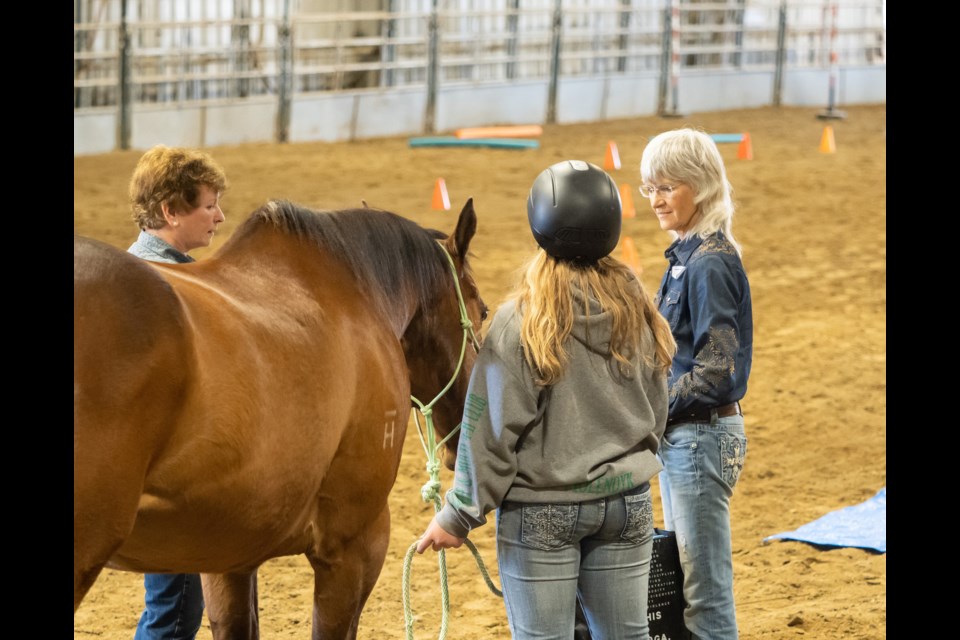OLDS — A program encouraging leadership and cooperation among students through work with horses has been so successful the teacher who helped run it hopes to operate something similar at École Olds High School this fall.
The program, called the Equine Leadership Academy, was offered this past spring for the first time ever to students in Grades 7 and 8 at École Deer Meadow School (ÉDMS). A dozen students signed up for it.
Academy programs are courses students can take as optional classes.
Grace Martin taught the program, in conjunction with Horizon Equine EFW (Equine Facilitated Wellness). That company, owned and operated by Colleen Herzog of Olds, provided the horses. Seven equine specialists also volunteered to help out.
From early April through early June, for a couple of days a week, students learned all about various aspects of horses through a combination of in-class learning and time spent with horses at the Calouri Pavilion.
They learned about equine behaviour, health, and anatomy, as well as how to build trust and connection with an animal, skills that Herzog said are also transferrable to their friends and peers.
“They were all from different classes, so they had to learn how to cooperate together and with teamwork. So we developed the teamwork skills in the classroom first before we introduced the horses,” Herzog said.
The program was financed by a Family and Community Support Services (FCSS) grant as well as fees from the students’ parents.
Martin said the students didn’t ride the horses. Instead, they did breathing and haltering exercises as well as cared for the horses, communicating with them through body language.
“Student leadership and student confidence is what we focused on -- your energy, your body posture, how your body posture is communicating with this animal,” she said.
Martin said students learned that “we could keep the horse calm if we were in a calm state of being.”
Martin said some students from rural areas were intrigued. They had never been exposed to dealing with horses that way.
Both Martin and Herzog saw huge growth in the kids.
“The biggest, biggest growth that I saw was from my students who don't have an agricultural background, who have lived in town and were just interested in horses; mostly students who are quite introverted, quite quiet,” Martin said.
“Students who may have struggled with emotions in the past were given the opportunity to express themselves in a very confident manner with confident body language.”
As a result, Martin, who is transferring from ÉDMS to the high school this fall, hopes to get a similar program running there.
When interviewed, Martin was not quite sure exactly what the program would look like, but she envisioned something similar to the Deer Meadow program, providing Career and Technology Services (CTS) credits.
“One of my dreams is to be able to develop this program so that it would lead into other programs at the college like our vet tech programs there,” she said.
“It's kind of like a horse care 101, whichever that agricultural science course module is,” she said.
Before retiring, Herzog used to work in the human services field, including a therapy program where high-risk youth worked with dogs.
Because she raises horses, she got the idea for the program at Deer Meadow.
“I saw the benefits of working with animals and connecting with animals and how it brings out our own characteristics and things we need to work on, because they value that relationship with animals, and so they really want to do it themselves,” she said.
“They motivate themselves to do this and we just provide the parameters around the psychology of it, the behaviour of the animals, and how to get the best behaviour from animals.
“It's learning leadership and learning about your own self-awareness; building confidence around large animals and having that motivation to make changes and try new things and all the things that have to come from internally.”
Herzog also saw growth in the students.
“They saw the importance of building these social relationships with each other and to help the horses,” she said.
"By helping the horses, again, it was a motivational piece for the kids to work out different methods of helping each other.
“It seemed like it really put the statuses of the kids aside and the social hierarchy of the kids aside, and put the horse hierarchy in.”
Herzog is hoping the program will be offered again in ÉDMS and she’s excited about the possibility of offering something similar in the high school.



